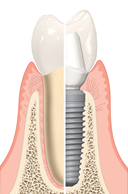A Dental Implant is an artificial replacement for a tooth root, usually made from Titanium. It is fixed, does not move and can help restore your smile, function and confidence.
The procedure itself is a painless experience. The postoperative symptoms are controlled with modern medication which has shown to be effective.
If your natural tooth is extracted, it immediately starts to lose its supporting bone in both length and width. Therefore, the aim during the placement of any implant is to achieve immediate close contact with surrounding bone soon after you have had the extraction.
Implant placement is a relatively simple minor surgical procedure that will be done under sterile condition. It is performed under local anaesthetic. If required, if during the assessment, the underlying bone is insufficient, bone regeneration is carried out prior or at the same time as implant placement.
The implant will be left to heal and integrate with the bone for a period of twelve to fourteen weeks.
Once integrated, Implant will bring into function with a variety of new teeth ranging from a single crown, small or large bridge, or a removable overdenture.

The process starts with an assessment and treatment planning which includes:
It is important to remember that implants are not “Fit and Forget” and that they need the same care and attention as natural teeth. Once completion of the treatment, it will be necessary for you to attend a number of recall appointments to check the condition of the implant(s) and to adjust the bite if required. After this, regular six-monthly appointments should be made as normal for dental check-ups. Although the gum tissue around the implants is fairly resistant to infection, you should still keep your regular hygiene appointments as a build-up of plaque will cause problems and possible bone loss from around your implants. This could result in their eventual loss. The frequency of hygienist visits will depend on your standard of oral hygiene. Long term maintenance of the implant and crown will be required, as for any other normal crown.
Routine maintenance may involve the replacement of the crown (not implant) due to wear and tear.
Implant
Implant Care
Implant Cleaning
Implant Maintenance Orthodontics